The World Health Organization (WHO) has declared a global health emergency due to the spread of Mpox, also known as monkeypox, particularly in Africa. While the situation raises concerns, the immediate impact on Germany is minimal. However, health authorities and experts, including virologist Hendrik Streeck, are urging caution and preparedness.

WHO raises alarm over Mpox subvariant spreading in Africa
A new subvariant of Mpox, Klade Ib, is currently spreading across Africa and may be more contagious and dangerous than previous strains. Despite this, the European Centre for Disease Prevention and Control (ECDC) assesses the risk of a widespread outbreak in Europe as “very low.” The Robert Koch Institute (RKI) has not yet detected any cases of this subvariant in Germany.
Virologist Professor Hendrik Streeck told the press that the threat of Mpox outbreaks in Europe remains low at the moment, but he emphasized the importance of vigilance among healthcare providers. He also advised that high-risk groups should consider vaccination, and healthcare authorities must stay informed about the virus. Streeck highlighted that the primary focus should be on containing the outbreak in Africa.

Mpox vaccination recommended only for high-risk groups
The RKI currently recommends Mpox vaccination only for certain high-risk individuals. These include people over 18 who have had close contact with confirmed Mpox cases or laboratory samples, as well as those with an elevated risk of infection. This group includes men over 18 who have sex with men and frequently change partners, and personnel in specialized laboratories handling infectious samples containing orthopoxvirus material.
Mpox, initially called monkeypox, was first discovered in monkeys in 1958, but the WHO changed the name in 2022 to prevent discrimination against animals or countries. The virus is transmitted through close skin-to-skin contact, often during sexual activity, and has a long incubation period. While these factors aid in containing outbreaks through contact tracing, isolation, and quarantine, Streeck warns that the virus could still spread further, making ongoing vigilance crucial.
The Klade Ib subvariant is still largely unresearched. Initial studies suggest it has higher transmissibility and can lead to severe cases, but detailed research is lacking. The outbreak is occurring in regions with limited access to healthcare and where many people suffer from malnutrition. Streeck stressed the importance of ensuring that vaccines and therapeutics are effective against this new variant.






